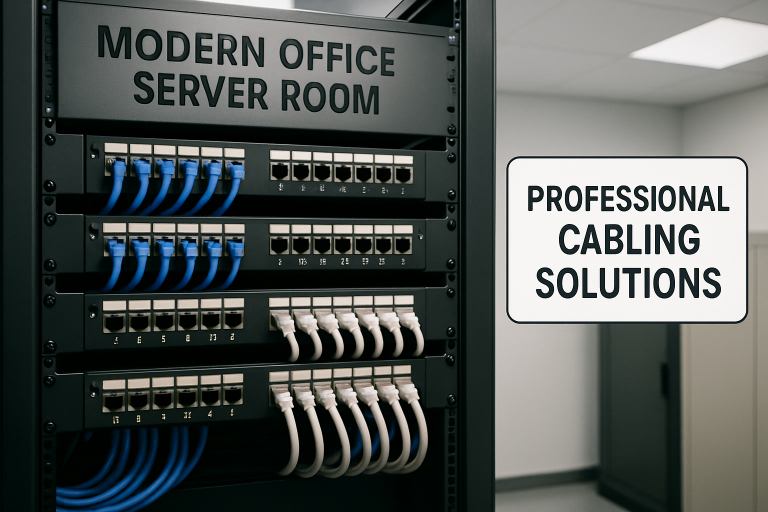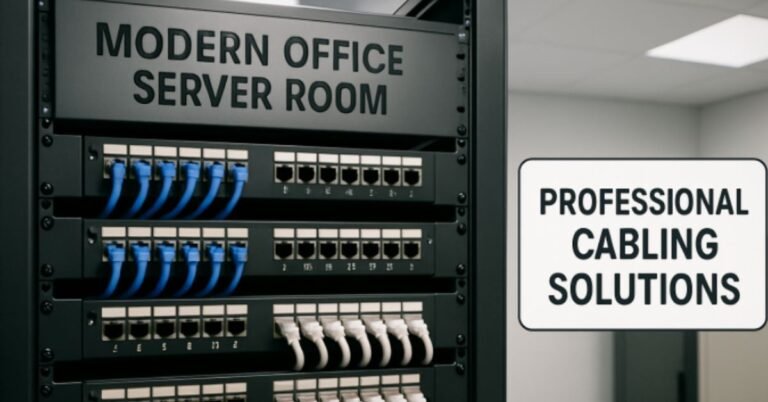Introduction
In the modern business landscape, where digital operations are at the core of productivity, a well-designed network infrastructure isn’t just a convenience—it’s a necessity. Selecting the best professional network cabling solution can define how smoothly your business runs, how well teams communicate, and how ready you are for future growth. The options can seem overwhelming for companies in urban centers, such as those seeking structured cabling Los Angeles. Making the correct choice comes from understanding your needs, evaluating providers for quality and experience, and considering scalability.
Solid network cabling solutions enable reliable data transmission, reduced downtime, and a foundation that supports advanced technology. Before investing, it’s essential to look at key aspects—from compliance and materials to long-term support. This comprehensive guide breaks down the most important factors when selecting professional network cabling to keep your business connected now and well into the future.
Assess Your Business Needs
Your first step should be a thorough evaluation of your company’s network requirements. Does your workspace span several floors, or is it a single suite? Are you connecting dozens of employee workstations, conference rooms, security cameras, and servers? Consider the type and amount of data your network will transfer daily and any special environmental needs, such as temperature control or electromagnetic interference. Consulting with an expert in network cabling can help you identify current and future needs, ensuring your investment lasts through your next phase of growth.
Take inventory of existing technology and map out possible upgrades, considering whether unified communications, VoIP solutions, or IoT devices are in your plans. Every detail—the number of endpoints, Wi-Fi access points, and redundancy requirements—will affect your cabling plan.
Verify Certifications and Industry Standards
Ensuring your cabling partner follows industry standards is crucial. Look for companies with certified technicians from organizations such as BICSI (Building Industry Consulting Service International) and TIA (Telecommunications Industry Association). Certification is key to avoiding costly compliance failures. Adherence to standards means your infrastructure will support the newest technologies without unexpected compatibility problems. This focus on compliance is echoed across the industry and highlighted by authoritative sources such as cabling installation & maintenance.

Evaluate Quality of Materials and Technology
Your network’s success hinges on using high-quality cabling, connectors, and hardware. Substandard materials can degrade over time, causing packet loss, signal dropouts, and frequent repairs or replacements. Not only does poor-quality cabling endanger your data integrity, but it also risks increased total cost of ownership. Insist that your provider uses branded, standards-compliant cabling and state-of-the-art technology to safeguard against obsolescence and performance dips.
Choosing good materials also ensures your infrastructure can handle higher speeds (such as Cat6A or fiber optic), which is essential as your business’s bandwidth needs grow. For additional perspective on material significance and modern networking demands, visit Signal Solutions’ blog on structured cabling standards.
Consider Provider’s Experience and Reputation
Proven expertise matters. Established providers will have a portfolio of previous projects and positive customer testimonials. Their teams will be equipped to handle unique challenges, unexpected issues, and customized needs. Reputation also signals a commitment to ongoing support, transparent communication, and deadline adherence. Request references and research online reviews to ensure your provider delivers on their promises and consistently meets or exceeds industry benchmarks.
Assess Scalability and Future-Proofing
Scalability ensures that your network infrastructure can expand as your business grows, without requiring a complete overhaul. The best network cabling designs incorporate additional ports, modular systems, and clearly labeled pathways for easy upgrades. This saves time and money during expansion and minimizes potential disruptions to your operations. By future-proofing with structured cabling, businesses can confidently adopt new technologies as they arise.
Review Customer Support and Maintenance Services
When evaluating a network installation partner, it’s crucial to consider post-installation support. A reliable provider goes beyond setup by offering comprehensive maintenance packages, rapid-response troubleshooting, and proactive system monitoring to prevent issues before they escalate. Quick and effective support reduces the risk of costly downtime, ensuring your business operations remain smooth and productive. Clear, well-defined support terms are essential, covering everything from routine checkups and software updates to emergency repairs and technical guidance. Choosing a partner committed to ongoing care protects your investment and provides peace of mind, knowing your network infrastructure will perform efficiently under any circumstances.
Align with Budget and Value
Finally, while staying within budget is essential, opting for the lowest-priced option can often lead to greater expenses over time. Poor installation, substandard materials, or inadequate customer service can result in repeated repairs, inefficiencies, and frustration. Instead, prioritize providers offering clear, transparent quotes that outline all costs upfront, ensuring no hidden fees. Assess overall value by considering not just price, but also the provider’s reliability, the range of services included, and the quality of long-term support. Choosing the right partner means balancing initial investment with durable performance, ongoing satisfaction, and potential future savings.
Conclusion
Your network forms the foundation of your business operations. Choosing a cabling solution is a critical investment in efficiency, reliability, and long-term growth. Selecting the proper infrastructure goes beyond immediate needs—it requires careful evaluation of current and future demands, ensuring that your network can handle increasing data loads and evolving technologies. Verifying installer credentials, insisting on high-quality materials, and planning for scalability and ongoing support are essential steps to prevent downtime and costly disruptions. A well-designed cabling system supports seamless daily operations and enables smooth adaptation as technology advances. A strategic, forward-thinking approach ensures your business remains fully connected, resilient, and ready for future expansion and innovation.

